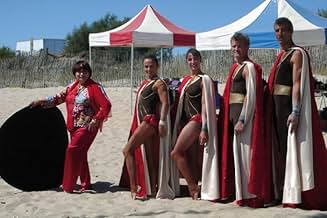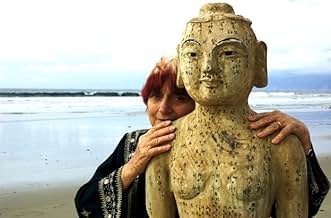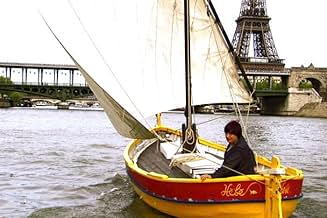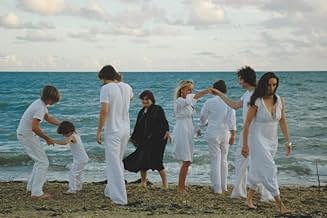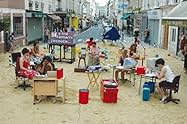AVALIAÇÃO DA IMDb
8,0/10
5,2 mil
SUA AVALIAÇÃO
Agnès Varda explora suas memórias, em sua maioria cronologicamente, com fotografias, clipes de filmes, entrevistas, recriações e cenas contemporâneas engraçadas e divertidas de sua história.Agnès Varda explora suas memórias, em sua maioria cronologicamente, com fotografias, clipes de filmes, entrevistas, recriações e cenas contemporâneas engraçadas e divertidas de sua história.Agnès Varda explora suas memórias, em sua maioria cronologicamente, com fotografias, clipes de filmes, entrevistas, recriações e cenas contemporâneas engraçadas e divertidas de sua história.
- Direção
- Roteiristas
- Artistas
- Prêmios
- 12 vitórias e 13 indicações no total
Gerald Ayres
- Self
- (as Gerry Ayres)
Patricia Louisianna Knop
- Self
- (as Patricia Knop)
- Direção
- Roteiristas
- Elenco e equipe completos
- Produção, bilheteria e muito mais no IMDbPro
Avaliações em destaque
I was fortunate to catch (October 30, 2009 in SF) "The Beaches of Agnès" aka "Les Plages d'Agnès" 2008, in French with English subtitles. Agnès Varda is 80 (in 2008) and still so lively, creative, imaginative, giving us delightful reminiscing of The New Wave film period, including the young and the old. What a filmmaker, cinematic lover, unique lady, she is. Besides being a retrospective look at Varda's cinematic life (so far), the film also serves as a loving dedication to the close to 30 years she shared with her husband Jacques Demy - the fabulous w-d-filmmaker who gave us the popular French films entirely sung musically: "The Young Girls of Rochefort" 1967 and "The Umbrellas of Cherbourg" 1964 (Catherine Deneuve was in both of these two gems).
If you like movies, film history, graphic design, visual play on imagery (or affiliated to none of the above), you will (still) feel akin to Varda's 'Beaches' whether you thoroughly understands French, speaks the language, been to Paris-France, or not. She has delivered a cinematic journey of going through the various phases of her life, experiences in film-making, and added her unique stamp of Agnès Varda sensibility. It's a good place to be and 'tis fun to hang around with her. As my favorite Emily Dickinson epigram says: Delight has no Competitor, so it is always most. Yes, Agnès Varda is alive and well and still full of humor, bemused or otherwise - a fantastic spirited woman, ever the innovative-discovery eye afresh, so full of wisdom, be it wistful or witty.
This film is a great companion piece for viewing with her loving remembrance of Demy: Jacquot De Nantes (1991), which is in Black & White, and Color, documented the hometown childhood origin which grew into the lifelong cinematic passion of Jacques. Another enjoyable Varda-Demy film, anytime.
There is an accessible official site USA at "cinemaguild.com/beachesofagnes" and the trailer at "cinemaguild.com/beachesofagnes/trailer.html". Looks like DVD is available, released on March 2, 2010.
If you like movies, film history, graphic design, visual play on imagery (or affiliated to none of the above), you will (still) feel akin to Varda's 'Beaches' whether you thoroughly understands French, speaks the language, been to Paris-France, or not. She has delivered a cinematic journey of going through the various phases of her life, experiences in film-making, and added her unique stamp of Agnès Varda sensibility. It's a good place to be and 'tis fun to hang around with her. As my favorite Emily Dickinson epigram says: Delight has no Competitor, so it is always most. Yes, Agnès Varda is alive and well and still full of humor, bemused or otherwise - a fantastic spirited woman, ever the innovative-discovery eye afresh, so full of wisdom, be it wistful or witty.
This film is a great companion piece for viewing with her loving remembrance of Demy: Jacquot De Nantes (1991), which is in Black & White, and Color, documented the hometown childhood origin which grew into the lifelong cinematic passion of Jacques. Another enjoyable Varda-Demy film, anytime.
There is an accessible official site USA at "cinemaguild.com/beachesofagnes" and the trailer at "cinemaguild.com/beachesofagnes/trailer.html". Looks like DVD is available, released on March 2, 2010.
Granted, I am a huge fan of Agnès Varda's work—and persona. I've seen most of her American releases, which are, unfortunately, far fewer than the 46 films she's directed. Sorry to report that even Netflix only stocks 8 of her films; my local video store and library system, not even 1.
Eighty-one-year-old Varda is, first and foremost, a poet who happens to be holding a video camera. And with this, her autobiography, she quickly brings us into the stream of consciousness of her brilliant mind, regaling us with both fantastic images, filmic experiments, and words rendered so quietly and sweetly that it belies their utter veracity. With the fluidity of a Russian ballerina, she weaves still photos, clips from her films, present- day documentary footage, and fictional re-creations.
A viewer with a familiarity of her oeuvre will obviously take away greater understanding and enjoyment of this recounting of her life and work. Yet, I believe it's accessible even for the uninitiated, as a tribute to an artist and iconoclast who sustains a strong vision and keen insight into life and art. And a great big heart.
" 'If we opened up people, we'd find landscapes.' If we opened up me, we'd find beaches," she begins, an apt conceit for the half-Greek filmmaker who has lived her life near the sea. And thus, in the film's opening shots, she constructs a web of mirrors propped on easels in the sand, reflecting the incoming waves. These are fancy, gilded, furniture mirrors, large and small, capturing both la plage and Varda's reflection as she begins the narrative of her childhood. In and of itself, it's a beautiful installation piece—greatly enhanced by the reflexive quality of a sea of cameras filming themselves.
Moments later, she sets up family photos on blades of grass in the sand. While discussing an image of herself and her sister in their bathing suits, two little girls appear in current time, wearing the same sorts of suits. "I don't know what it means to re-create a scene like this. Do we relive the moment?" Varda wonders. But her answer seems less about reconstructing the past (this is not a wistful film like Bergman's Wild Strawberries), but more about delight in her powers as a magician with a camera. "For me, it's cinema, it's a game," she says.
Some of the film's sweetest moments derive from shots of her family—her two children and late-husband, fellow New Wave auteur Jacques Demy (The Umbrellas of Cherbourg). She obviously has great affection for the "peaceful island," as she describes them. In one lovely scene, the extended family is dressed in white gauze, frolicking. "Together they're the sum of my happiness. But I don't know if I know them, or understand them. I just go toward them."
Varda employs an unusual technique of re-creating the major moments of her life/films while bringing her current self into the proceedings. In the age of social networking a la Facebook, with gambits toward entering the past as we simultaneously dwell in the present, this seems a very contemporary notion. With the gift of memory, we both do and don't inhabit all of the times of our life at once. As she states, "I live. And as long as I live, I remember."
One of La Varda's most lovable traits is how utterly herself she can be. Her 8-decade-old hair sports its trademark bowl cut, yet in some scenes is colored almost parfait-like (sans cerise) with white on top and deep red around the ends—gloriously unconventional, and wry. And indeed her sense of humor is continually present. She also has the good sense not to take herself completely seriously. After revisiting her early home in Brussels and discovering that it is now inhabited by an avid train enthusiast who prattles on about his collection, she concludes, "The 'childhood home' part was a flop."
In 55 years of making films, the director has clearly spent ample time pondering the art of her craft. As she notes, "I think I've always lived in it." This is obviously so, and without traditional tutelage. She claims to have made her directorial debut, La Pointe-Courte, after having taken in just 10 films in her first 25 years. This greatly flouted convention within French film-making of the time, in which training and credentials were paramount. Much of the film concerns images and the context of their creation— the process of birthing, what prompts images into being, the results of their existence, the ripple effects of the filmmaker's art, and the inextricable link between maker and film.
Although Varda includes reenactments in this walk backward, she also allows the viewer to be in on their making. It's as if she hopes to underscore the artifice and revels in the fact that we will knowingly suspend our disbelief anyway. In one scene, she sets up a production office atop sand dumped on a city street.
The movie's final scene reveals Varda's "shack," a studio she's recently built on the beach. The filmmaker-as-architect metaphor made real, its walls are constructed of strips of celluloid from a 1966 film in carefully chosen colors, bathed in light. The structure is fragile yet appears solid. This is a wondrous metaphor, one that seems to encapsulate the artist's spirit and life. "In here, it feels like I live in cinema," she notes.
Eighty-one-year-old Varda is, first and foremost, a poet who happens to be holding a video camera. And with this, her autobiography, she quickly brings us into the stream of consciousness of her brilliant mind, regaling us with both fantastic images, filmic experiments, and words rendered so quietly and sweetly that it belies their utter veracity. With the fluidity of a Russian ballerina, she weaves still photos, clips from her films, present- day documentary footage, and fictional re-creations.
A viewer with a familiarity of her oeuvre will obviously take away greater understanding and enjoyment of this recounting of her life and work. Yet, I believe it's accessible even for the uninitiated, as a tribute to an artist and iconoclast who sustains a strong vision and keen insight into life and art. And a great big heart.
" 'If we opened up people, we'd find landscapes.' If we opened up me, we'd find beaches," she begins, an apt conceit for the half-Greek filmmaker who has lived her life near the sea. And thus, in the film's opening shots, she constructs a web of mirrors propped on easels in the sand, reflecting the incoming waves. These are fancy, gilded, furniture mirrors, large and small, capturing both la plage and Varda's reflection as she begins the narrative of her childhood. In and of itself, it's a beautiful installation piece—greatly enhanced by the reflexive quality of a sea of cameras filming themselves.
Moments later, she sets up family photos on blades of grass in the sand. While discussing an image of herself and her sister in their bathing suits, two little girls appear in current time, wearing the same sorts of suits. "I don't know what it means to re-create a scene like this. Do we relive the moment?" Varda wonders. But her answer seems less about reconstructing the past (this is not a wistful film like Bergman's Wild Strawberries), but more about delight in her powers as a magician with a camera. "For me, it's cinema, it's a game," she says.
Some of the film's sweetest moments derive from shots of her family—her two children and late-husband, fellow New Wave auteur Jacques Demy (The Umbrellas of Cherbourg). She obviously has great affection for the "peaceful island," as she describes them. In one lovely scene, the extended family is dressed in white gauze, frolicking. "Together they're the sum of my happiness. But I don't know if I know them, or understand them. I just go toward them."
Varda employs an unusual technique of re-creating the major moments of her life/films while bringing her current self into the proceedings. In the age of social networking a la Facebook, with gambits toward entering the past as we simultaneously dwell in the present, this seems a very contemporary notion. With the gift of memory, we both do and don't inhabit all of the times of our life at once. As she states, "I live. And as long as I live, I remember."
One of La Varda's most lovable traits is how utterly herself she can be. Her 8-decade-old hair sports its trademark bowl cut, yet in some scenes is colored almost parfait-like (sans cerise) with white on top and deep red around the ends—gloriously unconventional, and wry. And indeed her sense of humor is continually present. She also has the good sense not to take herself completely seriously. After revisiting her early home in Brussels and discovering that it is now inhabited by an avid train enthusiast who prattles on about his collection, she concludes, "The 'childhood home' part was a flop."
In 55 years of making films, the director has clearly spent ample time pondering the art of her craft. As she notes, "I think I've always lived in it." This is obviously so, and without traditional tutelage. She claims to have made her directorial debut, La Pointe-Courte, after having taken in just 10 films in her first 25 years. This greatly flouted convention within French film-making of the time, in which training and credentials were paramount. Much of the film concerns images and the context of their creation— the process of birthing, what prompts images into being, the results of their existence, the ripple effects of the filmmaker's art, and the inextricable link between maker and film.
Although Varda includes reenactments in this walk backward, she also allows the viewer to be in on their making. It's as if she hopes to underscore the artifice and revels in the fact that we will knowingly suspend our disbelief anyway. In one scene, she sets up a production office atop sand dumped on a city street.
The movie's final scene reveals Varda's "shack," a studio she's recently built on the beach. The filmmaker-as-architect metaphor made real, its walls are constructed of strips of celluloid from a 1966 film in carefully chosen colors, bathed in light. The structure is fragile yet appears solid. This is a wondrous metaphor, one that seems to encapsulate the artist's spirit and life. "In here, it feels like I live in cinema," she notes.
In a revealing and playful mood, filmmaker Agnes Varda narrates her own filmed autobiography in The Beaches of Agnes. The film begins with Varda, now 82, setting up mirrors on the beach with the sounds of one of her mother's favorite works, Schubert's Unfinished Symphony in the background Though she asserts that "Today, I'm playing a little old lady, talkative and plump," she looks anything like a little old lady. The film re-creates her life with childhood memories that take her back to homes she knew as a child in Brussels and the city of Sete where she made her first film at the age of 26.
The film is not a dry documentary, filled with reminiscences of people we never heard of. It is a work of art in itself, a celebration not only of her life, but of all life. Along the way, Varda takes us to Los Angeles (one of her favorite cities in which she lived) where she talks about and shows photos of her former husband Jacques Demy, who she announces died of AIDS in 1990, Jane Birkin, Chris Marker (dressed as a cartoon cat) and even poet, singer Jim Morrison. Varda began as a photographer and we see an example of her photos from a long time ago. While the film documents Varda's films beginning with her first Le Pointe Curé in 1956 to the present day and the first appearances on film of Gerald Depardieu, Phillipe Noiret, and Harrison Ford, she also discusses in detail and shows excerpts from her most popular films including Cléo from 5 to 7, Le Bonheur, Vagabond, The Gleaners and I, and her documentary tributes to her husband.
Rather than an egoists attempt to enhance a reputation with big events in which she participated, the film looks at small things like the uniform she had to wear in Vichy France and a scene at an outdoor flea market where the director finds cardboard cutouts of herself and other filmmakers with their works listed on the back. But there is much more. With actors dramatizing important memories from her life, The Beaches of Agnes is filled with the people, including her two grown children, places and events, including her trips to Cuba and China that contributed to her personal growth and made her the lively and vibrant person she is today. She closes the documentary by saying, "I am alive, and I remember." While we are still alive, we will remember her.
The film is not a dry documentary, filled with reminiscences of people we never heard of. It is a work of art in itself, a celebration not only of her life, but of all life. Along the way, Varda takes us to Los Angeles (one of her favorite cities in which she lived) where she talks about and shows photos of her former husband Jacques Demy, who she announces died of AIDS in 1990, Jane Birkin, Chris Marker (dressed as a cartoon cat) and even poet, singer Jim Morrison. Varda began as a photographer and we see an example of her photos from a long time ago. While the film documents Varda's films beginning with her first Le Pointe Curé in 1956 to the present day and the first appearances on film of Gerald Depardieu, Phillipe Noiret, and Harrison Ford, she also discusses in detail and shows excerpts from her most popular films including Cléo from 5 to 7, Le Bonheur, Vagabond, The Gleaners and I, and her documentary tributes to her husband.
Rather than an egoists attempt to enhance a reputation with big events in which she participated, the film looks at small things like the uniform she had to wear in Vichy France and a scene at an outdoor flea market where the director finds cardboard cutouts of herself and other filmmakers with their works listed on the back. But there is much more. With actors dramatizing important memories from her life, The Beaches of Agnes is filled with the people, including her two grown children, places and events, including her trips to Cuba and China that contributed to her personal growth and made her the lively and vibrant person she is today. She closes the documentary by saying, "I am alive, and I remember." While we are still alive, we will remember her.
It's not too often a filmmaker will give us a full and unambiguous autobiography on film; if we find out about who they are, he or she will bring themselves into the art that is ostensibly other stories. Agnes Varda looks back on her life using cinema and it is among the most unique things I've ever seen - though it is not inconsistent with many films she has made before (The Gleaners and I comes to mind) as far as her life being inextricably and most often joyfully being connected with her work. This doesn't mean she doesn't shy away from the pain as well; the parts regarding Jacques Demy in his final years are somber and tender.
Pure, unadulterated imagination, heart, empathy, a light yet wholly potent surrealism, a seemingly endless connection to other people, art, photography, and of course those cats (including an eccentric cameo by Chris Marker). I feel like I got a lifetime in just a little under two hours. And how about her cardboard car that she tries to park into her tiny garage!
And it's the kind of wonderful and priceless piece of autobiography that has digressions (one of which about Jim Morrison). It may help to see at least a few of her films before going into this, but even if you only have a cursory knowledge of film history or Demy or what have you, it's still effective and affecting as a story that contains many stories and is about getting us to see the world as vibrantly and daringly as she does.
As life changes and the world goes through other developments, the beaches stay the same.
Pure, unadulterated imagination, heart, empathy, a light yet wholly potent surrealism, a seemingly endless connection to other people, art, photography, and of course those cats (including an eccentric cameo by Chris Marker). I feel like I got a lifetime in just a little under two hours. And how about her cardboard car that she tries to park into her tiny garage!
And it's the kind of wonderful and priceless piece of autobiography that has digressions (one of which about Jim Morrison). It may help to see at least a few of her films before going into this, but even if you only have a cursory knowledge of film history or Demy or what have you, it's still effective and affecting as a story that contains many stories and is about getting us to see the world as vibrantly and daringly as she does.
As life changes and the world goes through other developments, the beaches stay the same.
The French movie Les plages d'Agnès was shown in the U.S. with the title The Beaches of Agnès (2008). It was directed by Agnès Varda.
This is a summing up movie, completed by Varda when she was 80 years old. It's really a semi-documentary, but it includes surreal elements that Varda interweaves with commentary, historical movie clips, and direct discussions with the us, the audience.
If you're an Agnès Varda fan, this movie will be perfect. If you've never seen a Varda film, it may not make much sense. Even so, it's interesting, funny, and poignant. If you're not sure, take a chance on it.
We saw the movie at the excellent Dryden Theatre in the George Eastman Museum in Rochester, NY. It was part of an Agnès Varda retrospective, cosponsored by Rochester Institute of Technology and the Eastman Museum. It will work better on the large screen, but it will be satisfactory on the small screen as well.
This is a summing up movie, completed by Varda when she was 80 years old. It's really a semi-documentary, but it includes surreal elements that Varda interweaves with commentary, historical movie clips, and direct discussions with the us, the audience.
If you're an Agnès Varda fan, this movie will be perfect. If you've never seen a Varda film, it may not make much sense. Even so, it's interesting, funny, and poignant. If you're not sure, take a chance on it.
We saw the movie at the excellent Dryden Theatre in the George Eastman Museum in Rochester, NY. It was part of an Agnès Varda retrospective, cosponsored by Rochester Institute of Technology and the Eastman Museum. It will work better on the large screen, but it will be satisfactory on the small screen as well.
Você sabia?
- CuriosidadesFrench visa # 118156.
- ConexõesEdited into Filme Socialismo (2010)
Principais escolhas
Faça login para avaliar e ver a lista de recomendações personalizadas
- How long is The Beaches of Agnès?Fornecido pela Alexa
Detalhes
- Data de lançamento
- País de origem
- Centrais de atendimento oficiais
- Idiomas
- Também conhecido como
- The Beaches of Agnès
- Locações de filme
- Empresas de produção
- Consulte mais créditos da empresa na IMDbPro
Bilheteria
- Orçamento
- € 1.900.000 (estimativa)
- Faturamento bruto nos EUA e Canadá
- US$ 239.711
- Fim de semana de estreia nos EUA e Canadá
- US$ 19.032
- 5 de jul. de 2009
- Faturamento bruto mundial
- US$ 2.235.006
- Tempo de duração
- 1 h 52 min(112 min)
- Cor
- Proporção
- 1.85 : 1
Contribua para esta página
Sugerir uma alteração ou adicionar conteúdo ausente

![Assistir a Bande-annonce [OV]](https://m.media-amazon.com/images/M/MV5BZGYxNzE1MDgtYjIzMy00NmY0LTkyMmItMTFkZjVlNmMyNTVmXkEyXkFqcGdeQXRyYW5zY29kZS13b3JrZmxvdw@@._V1_QL75_UX500_CR0)



